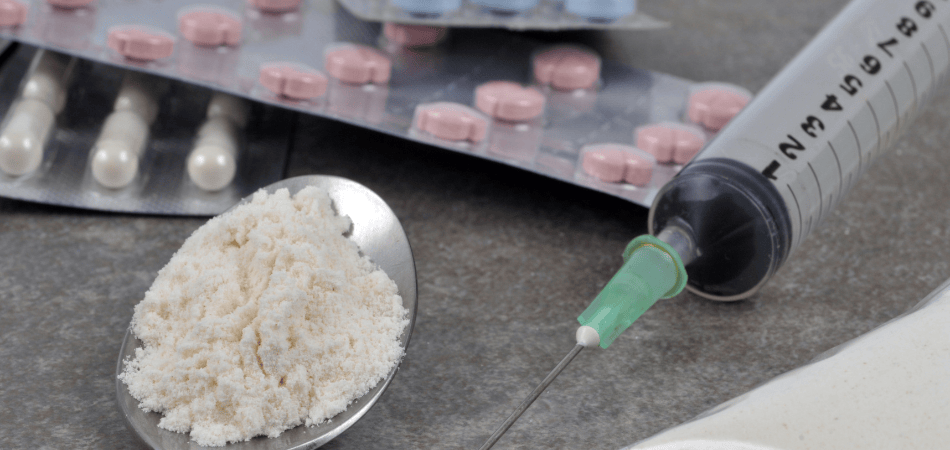DMT (N,N-Dimethyltryptamine) addiction
DMT is a powerful psychedelic drug that has been used for centuries by indigenous people in South America. In recent years, DMT has gained popularity in the Western world as a recreational drug. Proponents of DMT claim that it can provide users with a powerful spiritual experience but abuse can lead to a number of dangerous results, including DMT addiction and other harmful side effects. DMT addiction is a serious problem that requires professional treatment to help you get to the root causes of your addiction and walk the road to lifelong recovery.

What is DMT?
DMT, or N,N-dimethyltryptamine, is a naturally occurring psychedelic compound found in many plants and animals. It is also the active ingredient in Ayahuasca, a traditional Amazonian brewed medicine which Indigenous people believe is a sacred substance that can provide them with access to the spirit world. However, much of the DMT that is sold on the streets is synthetically manufactured in illegal labs as a white, crystalline powder that is typically vaporised or smoked in a pipe, but it can also be injected, snorted or consumed orally in the form of an Ayahuasca brew.
DMT produces powerful psychedelic effects that usually last for thirty to forty-five minutes when smoked or injected. When taken orally in the form of Ayahuasca, the effects can last for several hours and be extremely addictive. When DMT is ingested orally, it must be combined with an MAOI inhibitor to be effective (this is why Ayahuasca is traditionally brewed with MAOI-containing plants such as Banisteriopsis caapi). DMT abuse and addiction pose serious risks which are very important to understand before gambling with this dangerous substance.
How does DMT addiction develop?
DMT abuse and addiction are not common in the UK, but with the substance receiving greater exposure due to celebrity proponents like Joe Rogan, use is on the rise.
DMT addiction can develop when the drug is regularly abused. When someone uses DMT frequently, they may begin to feel that they need the drug in order to function on a day-to-day basis. This can lead to compulsive DMT-seeking behaviour and an inability to stop using DMT despite the negative consequences.
DMT addiction can also develop when the drug is used as a means of self-medication. Some people may turn to DMT in order to escape from difficult emotions or situations. Others may use it to self-medicate underlying mental health problems such as anxiety, depression or PTSD. As the drug is touted by proponents as a way to achieve “enlightenment” or attain a higher state of consciousness, some people may also abuse DMT in an attempt to find answers to life’s big questions.
Whatever the initial reason for DMT abuse, once DMT addiction has developed, it can be very difficult to break free from the drug without professional help.
Do I need DMT addiction treatment?
The symptoms of DMT addiction can vary depending on the severity of the condition and recognising that you are addicted can be difficult. Spotting the signs of DMT addiction in a loved one can also be very hard, particularly as DMT is a relatively unknown substance for many people. Here are some questions to ask yourself which may suggest you need DMT addiction treatment:
- Have I been experiencing mental or psychological issues since I started taking DMT?
- Do I feel like I need to take DMT in order to just get through the day?
- Do I keep taking DMT even though it’s causing problems in my life?
- Have I experienced DMT withdrawal symptoms when I have tried to stop or cut down on my DMT use?
- Have I lied to loved ones about my DMT use?
- Do I use DMT rather than engage in activities I used to enjoy?
If you have answered yes to any of the above, it’s important to seek help for your DMT addiction as soon as possible. Liberty House can provide the expert DMT addiction treatment you need to overcome your addiction and start rebuilding your life.
What are the risks of DMT addiction?
Hallucinogenic addictions, including DMT addiction, can cause a number of physical, psychological and social problems. These include:
Psychological problems
DMT addiction can cause or exacerbate mental health problems such as:
- Anxiety
- Depression
- Schizophrenia
- Psychosis
- DMT flashbacks
It can also lead to dissociative disorders and disturbances in perception, thought and mood. In some cases, people may experience flashbacks months or even years after taking DMT.
Physical problems
DMT addiction can lead to a number of physical health problems including:
- Liver damage
- Kidney damage
- High blood pressure
- Rapid heartbeat
- Chest pain
- Agitation
- Seizures
- Coma
- Risk of asphyxiation and death
- Risk of accident and injury due hallucinations
Cognitive problems
DMT abuse has been linked to difficulties with memory, learning, concentration and decision-making.
Social problems
As with other forms of drug addiction, DMT abuse and addiction can also lead to a number of social problems, such as:
- Relationship difficulties
- Problems at work or school
- Financial problems
- Legal problems
- Isolation and social withdrawal
What do proponents of DMT say?
In recent years, there have been a number of high-profile figures who have spoken about their use of DMT, including author Terence McKenna, musician Sting, and podcaster Joe Rogan who claims that he once did DMT three times in one day. Proponents of the drug often talk about the mystical or spiritual experiences they have had while under the influence of DMT and explain that the drug has helped them to achieve “enlightenment” or attain a higher state of consciousness.
The issue with DMT is the same as many hallucinogenics, in that, for some people, it can and does cause more harm than good. While there are some people who may be able to use DMT without developing an addiction, and who may indeed find their perceptions or thoughts transformed for the better, for others, the drug can be extremely addictive and lead to a number of serious problems.
How is DMT addiction treated?
There are three important stages in every effective DMT addiction treatment plan: detox, rehab and aftercare.
DMT detox
Detoxification is the first step in treating DMT addiction and should always be done under medical supervision. While DMT withdrawal does not usually result in the kind of withdrawal symptoms you may get with other substances, because it is such a powerful psychedelic substance, there is a risk of experiencing psychological problems during detox.
For this reason, it’s important to have 24/7 support throughout the detox process. At Liberty House, DMT detox is provided as an inpatient service so you can be carefully monitored by our team of medical professionals who will ensure your safety and comfort.
DMT rehab
In addition to cleansing your body of DMT, you will also need to address the psychological issues that led to your DMT addiction in the first place. This is done through our comprehensive DMT rehab programme, which includes:
- One-to-one therapy
- Group therapy
- Cognitive behavioural therapy (CBT)
- Family therapy
- Yoga therapy
- Art therapy
- Gong bath
Our DMT rehab programme is designed to help you develop the skills and knowledge you need to cope with life without DMT and to avoid relapse in the future. DMT rehab also takes place in our inpatient treatment centre as we believe this is the best setting for effective DMT addiction recovery.
As a resident, you will have no access to DMT, will be able to focus solely on your recovery without the distractions and temptations of everyday life and will have the opportunity to build relationships and connections with the staff and other clients.
Aftercare
When you have completed DMT rehab and left Liberty House, you will then embark on your aftercare programme. This will involve weekly group therapy sessions which will provide you with ongoing support and guidance as you adjust to life without DMT.
Relapse prevention tips
Leaving the safety and sanctuary of DMT rehab can be a difficult adjustment, particularly as you will be once again exposed to the same people, places and situations that may have contributed to your DMT addiction in the first place. For this reason, it’s important to have a solid relapse prevention plan in place to help you stay on track. Here are some tips:
- Avoid people, places and things associated with your DMT use
- Attend your aftercare therapy sessions
- Take an active part in our Alumni Network activities
- Try new hobbies and meet new, healthy-living people who will support your recovery
- Regularly check in with your therapists
What to do next
If you are struggling with DMT addiction, Liberty House can provide the support and treatment you need. Get in touch with us today and our admissions team will explain how to get started on your road to recovery.








